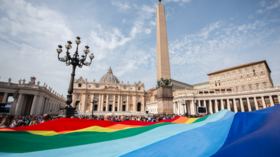African Catholic bishops say no same-sex union blessings
Ghanaian and Nigerian Catholic bishops insist that homosexual relationships violate both the laws of God and their countries
Catholic bishops in Nigeria and Ghana have declared their refusal to permit priests to bless same-sex unions, despite Pope Francis’ recent declaration allowing such rituals under certain circumstances.
The Catholic Bishops Conference of Nigeria (CBCN) and the Ghana Catholic Bishops Conference (GCBC) both claimed in separate statements on Wednesday and Thursday, respectively, that blessing homosexual marriages contradicts the divine law and teachings of the church.
“The Catholic Bishops Conference of Nigeria assures the entire people of God that the teaching of the Catholic Church on marriage remains the same. There is, therefore, no possibility in the teaching of the Church of blessing same-sex unions and activities. That would go against God’s law, the teachings of the Church, the laws of our nation,” it stated.
The bishops of Ghana, who have long opposed homosexuality as a threat to the survival of the human race, also stated, “We wish to reiterate that priests cannot bless same-sex unions or marriages.”
A document issued by the Vatican’s doctrinal office on Monday encouraged Roman Catholic priests to bless same-sex couples on a “case-by-case basis.” It was emphasized, however, that the process is not intended to replace the sacrament of heterosexual marriage, nor could it take place during a regular church ceremony or liturgy. The declaration, according to the Vatican, would reflect that “God welcomes all” types of people, but that such blessings would not legitimize “irregular” situations or relationships. According to Roman Catholic doctrines, a blessing is when a priest or minister asks God to protect or favor a person or people.
The publication of the document sparked public outrage and controversy, with even a group of British priests arguing against it. On Thursday, the UK’s Confraternity of Catholic Clergy issued a letter signed by 500 priests insisting that the Church’s traditional values are “unchangeable.”
Catholic dogma teaches that while being attracted to someone of the same sex is not a sin, engaging in homosexual acts is. Pope Francis has taken steps to make the church more welcoming to LGBTQ people since becoming Pope in 2013.
While maintaining their anti-homosexuality stance, the Ghanaian and Nigerian bishops’ organizations claimed that the Pope’s recent approval allowing the blessing of same-sex marriage was misinterpreted.
“The blessing, which the declaration says could be given to everyone, refers to prayers that people may request for. For those in a state of sin, the prayers are meant to lead them to conversion. Therefore, the prayers for persons in same-sex relationships are not intended to legitimize their way of life, but to lead them on the path of conversion,” the GCBC stated.
Both Ghanaian and Nigerian laws criminalize LGBTQ unions to varying degrees.
Nigeria’s Same-Sex Marriage Prohibition Act, 2013, imposes 14 years of imprisonment on persons found guilty. Individuals who administer, witness, or assist in the solemnization of a same-sex marriage in Africa’s most populous country face a ten-year prison sentence. In August, more than 100 alleged homosexuals who attended a same-sex wedding event in the country’s Delta state were arrested by the police.
Lawmakers in Ghana unanimously passed a motion recently to tighten laws on homosexuality, which human rights groups like Amnesty International have condemned, claiming it violates civil rights enshrined in the country’s constitution.
US Vice President Kamala Harris and French Minister for International Partnerships Chrysoula Zacharopoulou have both urged Ghana and other African countries to follow the lead of the West in promoting gay rights.






Comments are closed.